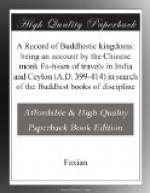(8) The text is simply “those in white clothes.” This may mean “the laity,” or the “upasakas;” but it is better to take the characters in their common Chinese acceptation, as meaning “commoners,” “men who have no rank.” See in Williams’ Dictionary under {.}.
(9) I do not wonder that Remusat
should give for this—“et s’en
retournent apres.” But
Fa-hien’s use of {.} in the sense of “in
the
same way” is uniform throughout
the narrative.
(10) Hardy’s M. B., p. 183, says:—“The alms-bowl, given by Mahabrahma, having vanished (about the time that Gotama became Buddha), each of the four guardian deities brought him an alms-bowl of emerald, but he did not accept them. They then brought four bowls made of stone, of the colour of the mung fruit; and when each entreated that his own bowl might be accepted, Buddha caused them to appear as if formed into a single bowl, appearing at the upper rim as if placed one within the other.” See the account more correctly given in the “Buddhist Birth Stories,” p. 110.
(11) Compare the narrative in Luke’s Gospel, xxi. 1-4.
(12) See chapter viii.
(13) This, no doubt, should be Hwuy-ying. King was at this time ill in Nagara, and indeed afterwards he dies in crossing the Little Snowy Mountains; but all the texts make him die twice. The confounding of the two names has been pointed out by Chinese critics.
(14) “Came to his end;”
i.e., according to the text, “proved the
impermanence and uncertainty,”
namely, of human life. See Williams’
Dictionary under {.}. The phraseology
is wholly Buddhistic.
CHAPTER XIII
Nagara. Festival of Buddha’s skull-bone. Other relics, and his shadow.
Going west for sixteen yojanas,(1) he came to the city He-lo(2) in the borders of the country of Nagara, where there is the flat-bone of Buddha’s skull, deposited in a vihara(3) adorned all over with gold-leaf and the seven sacred substances. The king of the country, revering and honouring the bone, and anxious lest it should be stolen away, has selected eight individuals, representing the great families in the kingdom, and committing to each a seal, with which he should seal (its shrine) and guard (the relic). At early dawn these eight men come, and after each has inspected his seal, they open the door. This done, they wash their hands with scented water and bring out the bone, which they place outside the vihara, on a lofty platform, where it is supported on a round pedestal of the seven precious substances, and covered




